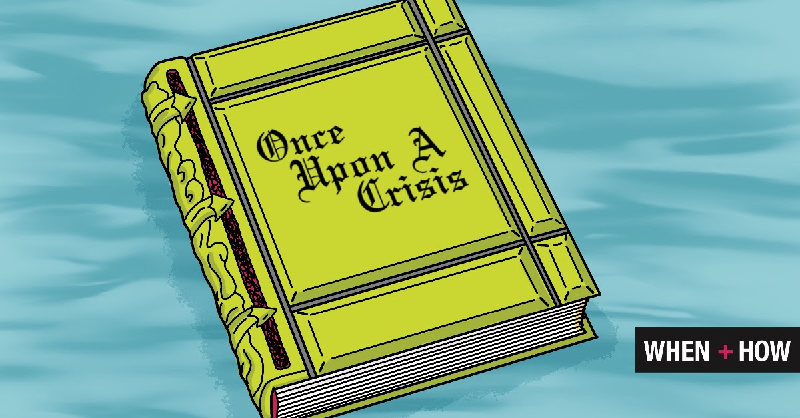How to Rekindle Confidence in Your Leadership After a Crisis (Not What You Think)
 Adele Cehrs, CEO / Founder, When + How AgencyChip Massey, Former FBI Hostage Negotiator and Special Agent, Partner, When + How AgencyIf you’re a leader, spokesperson or authority figure for your organization, then I have an important question for you:What separates an organization that successfully rebounds from – and even thrives after – a huge crisis (such as the current Coronavirus situation)…from one that takes a permanent blow, topples over, and struggles to ever recover afterwards?
Adele Cehrs, CEO / Founder, When + How AgencyChip Massey, Former FBI Hostage Negotiator and Special Agent, Partner, When + How AgencyIf you’re a leader, spokesperson or authority figure for your organization, then I have an important question for you:What separates an organization that successfully rebounds from – and even thrives after – a huge crisis (such as the current Coronavirus situation)…from one that takes a permanent blow, topples over, and struggles to ever recover afterwards?
The answer is not what you might think.
And as someone who’s been through countless crises, emergencies and high-stakes situations…Chip has a very interesting (and counter-intuitive) take on the situations that most people would prefer to never encounter.Yes, it relates to the ongoing “COVID-19”…but also to just about any adverse event that impacts your organization. Because what many never realize is that at the heart of every crisis is a hidden opportunity.It’s often undetected. Unnoticed. While we sit there transfixed on what’s happening, it’s slipped in through the back door – but no one has turned around to actually recognize that it’s there.But it’s something that, when seized correctly, can create huge momentum for us after a crisis. It can determine whether we land with our best foot forward and hit the ground running…or suffer a serious setback that fills our horizon with doom and gloom.How do we seize this opportunity? It all comes down to how we, as leaders, handle the aftermath of a crisis. Specifically, on the emotions you focus on and use to rekindle confidence in your leadership and get everyone back on track, stronger than ever.As it turns out, there’s a surprisingly strong emotion embedded deep inside psychology that, when reignited, has the power to remind them why they need you.Because people can only go as far as their leaders can take them. But they won’t follow one that they can’t put their full trust in. So what’s the #1 most powerful emotion we can trigger to get back respect?I’ll give you one hint – it isn’t your first guess. I’ll reveal what this is in a second, but first I want you to picture something:You’ve just heard some bad news. It can be major (like a global crisis) or minor (like a project deadline, impatient boss or angry client). Either way, at this moment, adrenaline and cortisol (the best-known stress hormones) are being pumped into your system by your adrenal gland. Your heart rate and blood pressure are shooting up. At the same time, your non-essential body functions are being downgraded so your energy can be focused on survival.Our ability to reason is often the first victim of that system downgrade. Our analytical abilities suffer because these hormones trigger a cascade of responses that are designed to handle immediate physical threats, not perceived ones.Another big victim is our ability to see and hear with discernment. This explains why workplace stress can cause “brain freeze” and “dry mouth” just when we need to be thinking fast and speaking coherently. Simply put, your amygdala is being hijacked and your brain is serving up a potent chemical cocktail that’s delivered directly to your bloodstream for maximum effect (and impairment).It’s a fantastic response when we’re confronted with the occasional grizzly bear, but it’s a horrendous one when we’re trying to finish a project while our bosses are breathing down our necks.The problem is with how our brains are wired. For all of its marvels, the mind does a terrible job of discerning between actual and assumed dangers. It assigns the same emotional response to social distress as it does to survival situations. The more intense the social distress, the more likely our brain identifies it as a physical threat.And we can take this same negative emotional response and turn it into a powerful positive.That’s right, the 1 most powerful emotion we can trigger to get back respect is none other than Fear.The trick lies in taking the Fear that people are experiencing and bridging it to future expectations.First things, first, you need to take people out of “survival mode”. This is something Chip has spent a great deal of time doing as an FBI Special Agent and hostage/crisis negotiator. And it’s something I’ve done countless times throughout our careers as a crisis communication experts – both in organizations like the Infectious Disease Society of America and people like Vice President Joe Biden – and when advising CEOs, CMO and CCOs and other high-visibility figures that people turn to for an answer.
So how do you do this?
The best course of action when dealing with someone in this state is to use active listening skills and empathy. Allow them to talk as long as they want. If you do your job correctly, their fight-or-flight mentality will begin to subside. Gradually they’ll return to a more reasonable frame of mind.The next step is to train our brains to respond differently in the face of modern threats and fears. We need our brains to be fully online so that we can access our most effective problem-solving abilities when we need them the most.
How is this done?
By talking about it, addressing the problem, and facing what happened head on.Yes, we know it may be the worst, most terrible thing that may have happened under your leadership – but if you don’t move from FEAR to the FUTURE quickly enough — people will lose hope. Here are three phrases and statements you can implement to create curiosity and faith in your vision:Fear is only the announcement from our brains letting us know we are entering a new phase of possibility. Let’s use this crisis to move the organization forward. I’m curious about how you would advise us to look into the future? They say every crisis is an opportunity. Where do you think this can help us improve the organization and strengthen it? I have some ideas to share, but I wanted to hear your perspective. (Then use Forensic Listening Techniques recommended here).How do you think our clients/members might benefit from us taking a powerful move forward? What opportunities exist for us now that weren’t there before? Here’s three ways I think we can benefit…Naturally you don’t need to say it exactly like this (you’ll want to translate it into your own tone and style), but the message is clear:Address the fear. Label it as a normal response. And guide them out of it by reframing it as an opportunity. So if people are worried about Corona, put it front and center, take the sting out of it, and open up a dialogue on what everyone can do both now and after.On the other hand, if you run away from the Fear, fail to address, or treat it as the elephant in the room…and it’ll just be blaring in the back of everyone’s minds, totally drowning out anything you have to say.As always, if you have any comments or questions about what we’ve talked about, then feel free to respond and let me know.
About the Authors:
 Adele CehrsHeralded as a crisis communications expert, by the Wall Street Journal Adele Cehrs has worked with high-profile clients like Vice President Joe Biden, the CEO of Lockheed Martin Marillyn Hewson and the owner of the Washington Monumental Sports Ted Leonsis.As a well-respected entrepreneur, Adele was recently recognized as a "business wonder-woman" by the Washington Business Journal.She has also spoken at the United Nations and her talk was broadcast on United Nations Television and translated into eight languages. She is the author of the book: Spike Your Brand ROI: How to Maximize Results.
Adele CehrsHeralded as a crisis communications expert, by the Wall Street Journal Adele Cehrs has worked with high-profile clients like Vice President Joe Biden, the CEO of Lockheed Martin Marillyn Hewson and the owner of the Washington Monumental Sports Ted Leonsis.As a well-respected entrepreneur, Adele was recently recognized as a "business wonder-woman" by the Washington Business Journal.She has also spoken at the United Nations and her talk was broadcast on United Nations Television and translated into eight languages. She is the author of the book: Spike Your Brand ROI: How to Maximize Results.  Chip MasseyFormer FBI hostage negotiator and special agent, Chip Massey is a partner at the When and How Agency and helps companies like Goldman Sachs, MetLife.He has worked with the CIA to track down spies, lead high-profile criminal cases, and counter-terrorism investigations. Worked extensively in crisis situations, international kidnappings and fugitive apprehensions.As a business leader, Massey has worked with start-ups, corporations and nonprofit leaders on crisis situations, high-stakes negotiations and advanced interview techniques. He is a partner at the When and How Agency, a crisis communications consultancy, servicing Fortune 500 companies and high-profile individuals.
Chip MasseyFormer FBI hostage negotiator and special agent, Chip Massey is a partner at the When and How Agency and helps companies like Goldman Sachs, MetLife.He has worked with the CIA to track down spies, lead high-profile criminal cases, and counter-terrorism investigations. Worked extensively in crisis situations, international kidnappings and fugitive apprehensions.As a business leader, Massey has worked with start-ups, corporations and nonprofit leaders on crisis situations, high-stakes negotiations and advanced interview techniques. He is a partner at the When and How Agency, a crisis communications consultancy, servicing Fortune 500 companies and high-profile individuals.

